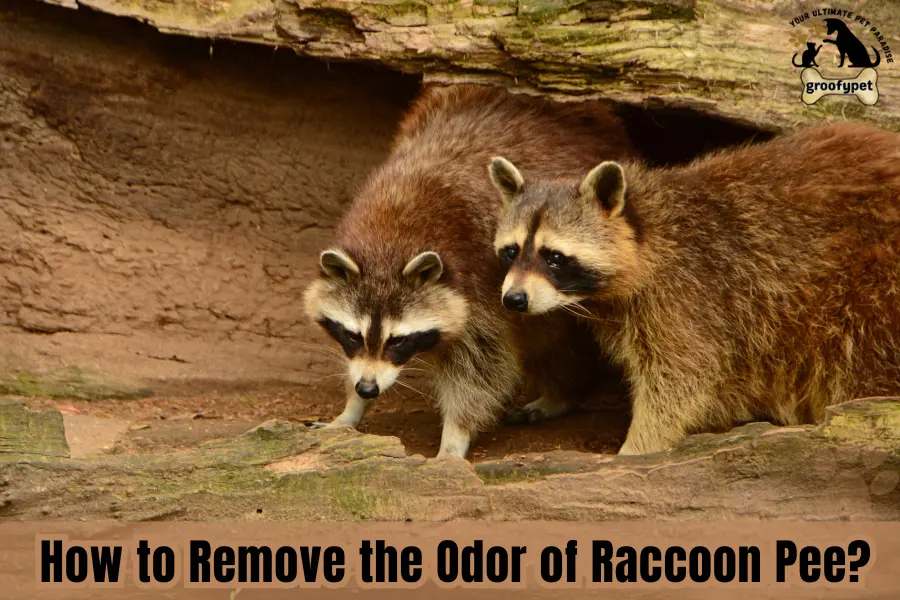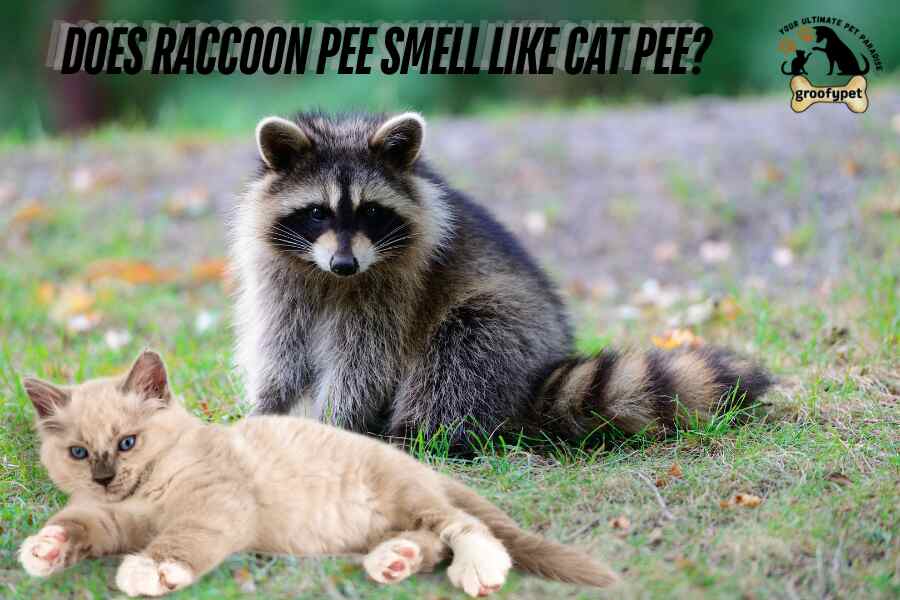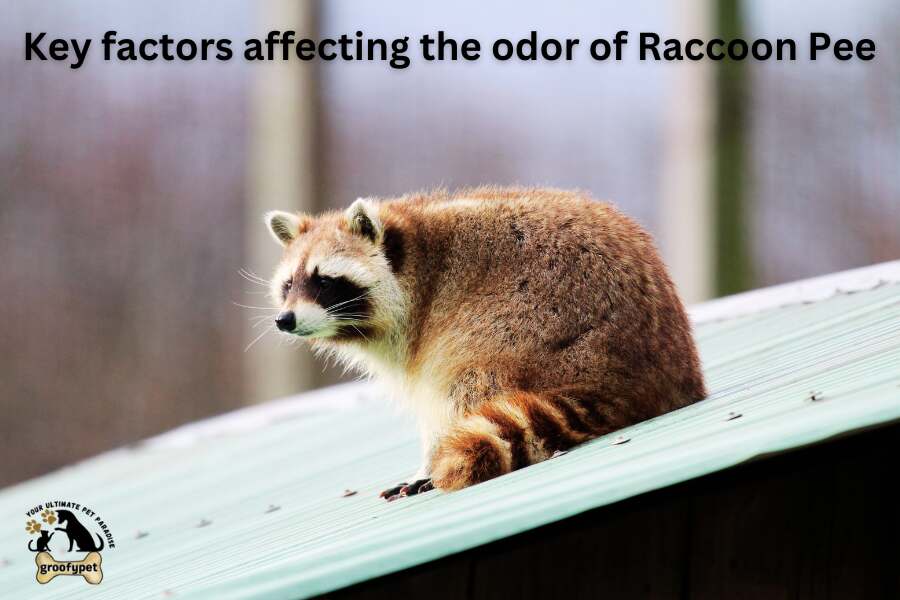| Key Factor | Affect the Odor |
| Concentration | Higher concentration of urine usually results in a stronger-smelling odor. |
| Frequency of Visits | Frequent visits to mark territory can lead to a more intense smell due to buildup. |
| Health of the Raccoon | A sick or stressed raccoon might have a more pronounced odor due to changes in their diet or health. |
| Marking Behavior | Male raccoons may have a heightened scent during mating seasons due to increased urine production. |
Why Raccoons Smell So Bad?
Why raccoons smell so bad is a question many homeowners ask when encountering these woodland creatures near their property. Raccoons smell so bad primarily because of specialized scent glands that produce potent secretions for territorial marking.
Why these mammals developed such strong odors relates to their evolutionary need to communicate with other raccoons. When raccoons smell so bad, they’re actually sending chemical messages to others of their species. Their omnivorous diet, which includes rotting food and garbage, further contributes to why raccoons smell so bad when they take up residence near homes.
Why raccoons smell so bad becomes particularly noticeable during mating season when their scent marking increases dramatically. Raccoons smell so bad when threatened as their odor serves as a defensive mechanism against predators.
Understanding why raccoons smell so bad helps homeowners identify infestations early, as the distinctive odor often permeates walls and insulation long before the animals themselves are spotted.
How to Remove the Odor of Raccoon Pee?
Examine the place where the urine or feces are found, which is usually in the loft or other parts of your home, before starting to clean up raccoon poop. Contact a veterinarian or doctor for advice on dealing with potential danger from roundworm eggs and spores that may be present.

Does Raccoon Pee Smell Like Cat Pee
I’ve dealt with both raccoon and cat problems in my house, and let me tell you – raccoon pee definitely doesn’t smell like cat pee! Raccoon pee has this awful, intense ammonia smell that just sticks around forever. It’s way stronger than what my cats produce. I learned this the hard way when raccoons got into my attic last summer.
My neighbor thought it was just my cats, but anyone who’s smelled raccoon pee knows better! The wildlife guy who helped me out explained that raccoons eat all kinds of gross stuff – garbage, rotting food, whatever they find – which makes their pee extra nasty. Plus, raccoon pee leaves these yellowish stains that are super hard to clean up. If you’re smelling something really strong and think it might be raccoon pee, don’t ignore it like I did.
How to Manage Raccoon Urine and Spray Odor
- Identify and locate the area where the raccoon urine smell is prominent.
- Raccoons mark potential nesting spots like trash cans, attics, and hidden places.
- The odor can sometimes linger and be confused with cat pee.
- Clean and disinfect the affected areas using a mixture of water and vinegar.
- For carpets and furniture, sprinkle baking soda to absorb and neutralize the smell.
- To clean and disinfect the regions that have been impacted, use a vinegar and water solution.
- Sprinkle a bit of baking soda on rugs and furniture so it can absorb and neutralize smells.
- Activated charcoal might be added to air purifiers in order to get rid of smells which persist.
- Use commercial pet odor neutralizers for a stronger solution.
- If the odor persists, use enzymatic cleaners designed to break down organic compounds and effectively eliminate the smell.
- Seal entry points to prevent raccoons from accessing your property again.
- Practice preventive measures such as securing food sources and sealing potential entry spots.
- Consult professionals if needed for wildlife removal services and assistance.
Is raccoon urine toxic?
Raccoons are the carriers of a parasitic disease — roundworm. Assuming that this disease does not affect them, it may be dangerous for people; they have a chance to receive neurological dysfunctions and die. These raccoons release this parasitic worm as well as its eggs within the feces.
That is why roundworm eggs that raccoons expel can adapt to a lot of pressure and temperature conditions, low and high. The eggs hatch only when they are dry, at which point they fly to another host.
It can be ingested by direct hand contamination with the feces or by inhaling sullied dust particles after the eggs have been suspended in the air. Of course, as not as dangerous as the roundworm, raccoon’s feces may also contain Giardia – a flagellated protozoan that poses a danger to us, too. Raccoon urine is no less dangerous, and it can cause a bacterial disease that poses a significant risk to our kidneys’ health – leptospirosis.
Leptospirosis can be excreted in the urine and discharges of raccoons. Contact with these discharges should not be made with open injuries or taken orally as it can cause disease in people. Different Diseases: Other bacterial diseases such as Salmonella or E. Coli, growth, and some parasites are also dangerous for disease in people.
Frequently Asked Questions
How to Identify Smells Similar to Cat Urine?
The scent of raccoon urine can mimic cat pee but is often more pungent and foul due to its higher levels of sulfates, ammonia, and other organic compounds. This distinctive odor, which can resemble sewer gasses or sewage, includes a mix of chemicals that creates a biological mixture of pungency and cat odor with a noticeable similarity to raccoon smell.
Is It Possible to Get Sick from Raccoon Urine?
Though it may smell slightly like cat poop, raccoon urine can be extremely dangerous to your health. Urine, feces, and saliva are among the secretions that can be exposed to by raccoons. Disease can spread through bites or scratches, and objects and the surroundings may get contaminated. Proper handling and avoiding bodily contact with these secretions are essential to prevent health issues.
Where Do Raccoons Pee?
Raccoons typically deposit their urine in latrines around their dens, leading to noticeable foul odors that signal their presence to other individuals. The excrement and urine create a strong scent, different from cat pee, which can help alert you to a pest issue. These odors are distinct and not to be confused with those of other animals.
Conclusion
When comparing raccoon and cat urine, it’s essential to recognize that they each have unique characteristics. While both can be a nuisance and create issues for homeowners, especially if the urine ends up in the attic or other insulation areas, their scent profiles differ significantly.
Raccoon urine tends to have a musky and stronger aroma, which might be perceived as less pleasant compared to the whiff of cat urine. This is due to the behavior and factors influencing each animal’s odor. In addition, raccoons are known to mark their territory more assertively, leading to a more intense scent.
For homeowners dealing with contamination, professional cleaning and restoration efforts might be necessary to fully address the issue. The scent of raccoon urine can sometimes be masked by the environment, making it blend with other odors, but it remains distinct from the relatively softer cat pee. Ensuring proper repair and clearing can help maintain a safe and pleasant home environment, especially if these animals have become a recurring problem.
Does Raccoon Pee Smell Like Cat Pee? Raccoons are either cute critters with bandit masks or troublesome pests, depending on how you see them. Whether you like them or not, understanding how they behave, especially how they mark their territory, can help you attract or keep them away.

The bandit-like critters are known for marking their territory with this distinct scent, which can sometimes be mistaken for the less adorable vermin they are often compared to. However, the scent of raccoon pee usually comes with a light earthy undertone that is different from the more pungent odor of feline urine. This scent serves as a way to attract or repel other animals, playing a role in their behavior and territorial conduct.
Understanding the scent of these masked critters can help in differentiating it from other odors in the environment. The peculiar scent of raccoon pee often leads to confusion with other earthy aromas but, with some exploration, the unique aroma of raccoons is clear. Despite the damage they may cause, there’s a certain love for unraveling the mystery behind these adorable yet masked creatures.
Table of Contents
ToggleDoes raccoon pee smell like cat pee?The signature scent of raccoon urine.
The answer to the issue of whether raccoon poop smells like cat poop can be found in their unique smell. The scent of raccoon urine is pungent, musky, and overtly ammoniac. In contrast to the slightly earthy note present in cat poop, raccoon urine has a strong scent that is frequently characterized by being intriguing and illuminating.
This presence is particularly evident around frequently visited nesting sites, such as attics, trash cans, and pathways near den areas. The characteristics of raccoon urine can be quite masked but are unmistakably different from the typical cat scent. Observing this sign around your property might indicate a raccoon’s pathway or den location.
When comparing raccoons, urine can have a distinctive scent that’s quite different from that of cat pee. In my personal experience, raccoon urine smells more pungent and musky, particularly if you find it in attic fans, rooftop vents, or peak vents. Raccoons tend to mark their territory in a variety of places, including insulation and attic spaces, which can cause serious damage.
In contrast, cats usually utilize a litter box. If there is faeces mixed in with the pee, the smell is stronger and more prominent making it harder to remove away of. To stop damage and keep the area fresher and less smelly sprinkle some catnip in litter box, raccoons must be kept out of these locations.
Does raccoon pee smell like cat pee? Unique Odor Differences
- When it comes to raccoon pee and cat pee, the unique scent of each can be quite distinct.
- Raccoon pee often has a strong, musky aroma with a noticeable earthy undertone, while cat pee tends to be sharper and more concentrated.
- This is due to the different ammonia levels and the raccoon’s natural musk, which give its urine a more overpowering and acrider quality.
- Experienced individuals might find it challenging to differentiate these scents without a closer inspection, especially in environments where the presence of other odors could mask them.
- Despite the similarities in their ammonia content, the unique characteristics of each odor reflect their distinct origins.
Is It Possible To Be Concerned About Raccoon Feces In My Home?
After identifying raccoon poop, you are likely to find more of them. This is because groups of raccoons choose a given geographical area as their bathroom and they will urinate on the surface at night consecutively. This is similar to how cats utilize the kitty litter. Therefore, when they have chosen a location they will come each morning to defecate on the selected area.
Key factors affecting the odor of Raccoon Pee

Diet
- Eating a variety of foods like crab good for cat and cat eats sardines also.
- Urine smells different depending on what they eat.
- Different foods affect the concentration of chemicals in their urine.
- This results in concentrated urine with a more intense smell.
Territory Marking
- Raccoons often mark their territories with a strong scent.
- They make their presence known through frequent visits to the same areas.
Gender and Health
- Male raccoon urine is more pungent during the mating season.
- The health of a raccoon influences the odor of its pee.
- Sick or stressed raccoons usually have stronger-smelling urine .
Personal Experience
- Based on observations, raccoons’ scent marking habits and urine smell strength vary significantly and sometimes its due to cat constipation.
- Unlike cats, whose urine odor remains consistent, raccoon urine odor varies more due to these factors.
Here’s how different key factors influence the odor of raccoon pee
Understanding these aspects can help differentiate between raccoon urine and other animal odors. This approach gives you insight into why the scent can be so distinctive and how it relates to the raccoon’s behavior and health.
| Key Factor | Affect the Odor |
| Concentration | Higher concentration of urine usually results in a stronger-smelling odor. |
| Frequency of Visits | Frequent visits to mark territory can lead to a more intense smell due to buildup. |
| Health of the Raccoon | A sick or stressed raccoon might have a more pronounced odor due to changes in their diet or health. |
| Marking Behavior | Male raccoons may have a heightened scent during mating seasons due to increased urine production. |
Why Raccoons Smell So Bad?
Why raccoons smell so bad is a question many homeowners ask when encountering these woodland creatures near their property. Raccoons smell so bad primarily because of specialized scent glands that produce potent secretions for territorial marking.
Why these mammals developed such strong odors relates to their evolutionary need to communicate with other raccoons. When raccoons smell so bad, they’re actually sending chemical messages to others of their species. Their omnivorous diet, which includes rotting food and garbage, further contributes to why raccoons smell so bad when they take up residence near homes.
Why raccoons smell so bad becomes particularly noticeable during mating season when their scent marking increases dramatically. Raccoons smell so bad when threatened as their odor serves as a defensive mechanism against predators.
Understanding why raccoons smell so bad helps homeowners identify infestations early, as the distinctive odor often permeates walls and insulation long before the animals themselves are spotted.
How to Remove the Odor of Raccoon Pee?
Examine the place where the urine or feces are found, which is usually in the loft or other parts of your home, before starting to clean up raccoon poop. Contact a veterinarian or doctor for advice on dealing with potential danger from roundworm eggs and spores that may be present.

Does Raccoon Pee Smell Like Cat Pee
I’ve dealt with both raccoon and cat problems in my house, and let me tell you – raccoon pee definitely doesn’t smell like cat pee! Raccoon pee has this awful, intense ammonia smell that just sticks around forever. It’s way stronger than what my cats produce. I learned this the hard way when raccoons got into my attic last summer.
My neighbor thought it was just my cats, but anyone who’s smelled raccoon pee knows better! The wildlife guy who helped me out explained that raccoons eat all kinds of gross stuff – garbage, rotting food, whatever they find – which makes their pee extra nasty. Plus, raccoon pee leaves these yellowish stains that are super hard to clean up. If you’re smelling something really strong and think it might be raccoon pee, don’t ignore it like I did.
How to Manage Raccoon Urine and Spray Odor
- Identify and locate the area where the raccoon urine smell is prominent.
- Raccoons mark potential nesting spots like trash cans, attics, and hidden places.
- The odor can sometimes linger and be confused with cat pee.
- Clean and disinfect the affected areas using a mixture of water and vinegar.
- For carpets and furniture, sprinkle baking soda to absorb and neutralize the smell.
- To clean and disinfect the regions that have been impacted, use a vinegar and water solution.
- Sprinkle a bit of baking soda on rugs and furniture so it can absorb and neutralize smells.
- Activated charcoal might be added to air purifiers in order to get rid of smells which persist.
- Use commercial pet odor neutralizers for a stronger solution.
- If the odor persists, use enzymatic cleaners designed to break down organic compounds and effectively eliminate the smell.
- Seal entry points to prevent raccoons from accessing your property again.
- Practice preventive measures such as securing food sources and sealing potential entry spots.
- Consult professionals if needed for wildlife removal services and assistance.
Is raccoon urine toxic?
Raccoons are the carriers of a parasitic disease — roundworm. Assuming that this disease does not affect them, it may be dangerous for people; they have a chance to receive neurological dysfunctions and die. These raccoons release this parasitic worm as well as its eggs within the feces.
That is why roundworm eggs that raccoons expel can adapt to a lot of pressure and temperature conditions, low and high. The eggs hatch only when they are dry, at which point they fly to another host.
It can be ingested by direct hand contamination with the feces or by inhaling sullied dust particles after the eggs have been suspended in the air. Of course, as not as dangerous as the roundworm, raccoon’s feces may also contain Giardia – a flagellated protozoan that poses a danger to us, too. Raccoon urine is no less dangerous, and it can cause a bacterial disease that poses a significant risk to our kidneys’ health – leptospirosis.
Leptospirosis can be excreted in the urine and discharges of raccoons. Contact with these discharges should not be made with open injuries or taken orally as it can cause disease in people. Different Diseases: Other bacterial diseases such as Salmonella or E. Coli, growth, and some parasites are also dangerous for disease in people.
Frequently Asked Questions
How to Identify Smells Similar to Cat Urine?
The scent of raccoon urine can mimic cat pee but is often more pungent and foul due to its higher levels of sulfates, ammonia, and other organic compounds. This distinctive odor, which can resemble sewer gasses or sewage, includes a mix of chemicals that creates a biological mixture of pungency and cat odor with a noticeable similarity to raccoon smell.
Is It Possible to Get Sick from Raccoon Urine?
Though it may smell slightly like cat poop, raccoon urine can be extremely dangerous to your health. Urine, feces, and saliva are among the secretions that can be exposed to by raccoons. Disease can spread through bites or scratches, and objects and the surroundings may get contaminated. Proper handling and avoiding bodily contact with these secretions are essential to prevent health issues.
Where Do Raccoons Pee?
Raccoons typically deposit their urine in latrines around their dens, leading to noticeable foul odors that signal their presence to other individuals. The excrement and urine create a strong scent, different from cat pee, which can help alert you to a pest issue. These odors are distinct and not to be confused with those of other animals.
Conclusion
When comparing raccoon and cat urine, it’s essential to recognize that they each have unique characteristics. While both can be a nuisance and create issues for homeowners, especially if the urine ends up in the attic or other insulation areas, their scent profiles differ significantly.
Raccoon urine tends to have a musky and stronger aroma, which might be perceived as less pleasant compared to the whiff of cat urine. This is due to the behavior and factors influencing each animal’s odor. In addition, raccoons are known to mark their territory more assertively, leading to a more intense scent.
For homeowners dealing with contamination, professional cleaning and restoration efforts might be necessary to fully address the issue. The scent of raccoon urine can sometimes be masked by the environment, making it blend with other odors, but it remains distinct from the relatively softer cat pee. Ensuring proper repair and clearing can help maintain a safe and pleasant home environment, especially if these animals have become a recurring problem.



